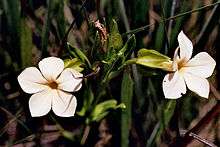Exaceae
Exaceae is a flowering plant tribe in the family Gentianaceae.[1] Exaceae comprises about 180 species assigned to eight monophyletic genera,[2] with major centres of endemism in continental Africa (about 78 endemic species and two endemic genera), Madagascar (55 endemic species and four endemic genera) and the southern tip of India and Sri Lanka (14 endemic species).[3]
| Exaceae | |
|---|---|
 | |
| Exochaenium grande | |
| Scientific classification | |
| Kingdom: | Plantae |
| Clade: | Tracheophytes |
| Clade: | Angiosperms |
| Clade: | Eudicots |
| Clade: | Asterids |
| Order: | Gentianales |
| Family: | Gentianaceae |
| Tribe: | Exaceae Colla, 1834 |
| Type genus | |
| Exacum L., 1754 | |
Genera
- Exacum L. (syn. Cotylanthera Blume)
- Exochaenium Griseb.
- Gentianothamnus Humbert
- Klackenbergia Kissling
- Lagenias E. Mey.
- Ornichia Klack.
- Sebaea Sol. ex R. Br. (syn. Belmontia)
- Tachiadenus Griseb.
gollark: It can differentiate things.
gollark: Why not?
gollark: You cared en ough to say that you cared 0 about it.
gollark: I'm insulted by you leaving out *my* CAS.
gollark: To be fair, it's too ill-defined to actually have obvious problems.
References
- Yuan, Yong-Ming; Wohlauser, Sébastien; Moller, Michael; Chassot, Philippe; Mansion, Guilhem; Grant, Jason; Küpfer, Philippe; Klackenberg, Jens (2003). "Monophyly and relationships of the tribe Exaceae (Gentianaceae) inferred from nuclear ribosomal and chloroplast DNA sequences" (PDF). Molecular Phylogenetics and Evolution. 28 (3): 500–517. doi:10.1016/S1055-7903(03)00068-X. PMID 12927134.
- Kissling, Jonathan; Yuan, Yong-Ming; Küpfer, Philippe; Mansion, Guilhem (2009). "The polyphyletic genus Sebaea (Gentianaceae): A step forward in understanding the morphological and karyological evolution of the Exaceae". Molecular Phylogenetics and Evolution. 53 (3): 734–748. doi:10.1016/j.ympev.2009.07.025. PMID 19646540.
- Pirie, Michael; Litsios, Glenn; Bellstedt, Dirk; Salamin, Nicolas; Kissling, Jonathan (2015). "Back to Gondwanaland: can ancient vicariance explain (some) Indian Ocean disjunct plant distributions?". Biology Letters. 11 (6): 20150086. doi:10.1098/rsbl.2015.0086. PMC 4528461. PMID 26063747.
This article is issued from Wikipedia. The text is licensed under Creative Commons - Attribution - Sharealike. Additional terms may apply for the media files.